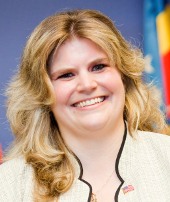
Eight years ago, newly drawn legislative maps cost Republicans their supermajorities in the House and Senate.
This year, the final election with the districts drawn in 2011, Republicans could lose their majorities, period.
In their fifth and final outing with the current districts, Republicans in the legislative majority face a daunting set of maps. Registered Republicans might outnumber Democrats by nearly 100,000 statewide, but Democrats made significant voter registration gains in Phoenix suburbs, where a handful of districts in which Republicans held double-digit leads in voter registration in 2012 are now well within reach for Democrats.
With just one true exception — and one technicality — House and Senate seats have only flipped when fewer than 10 percentage points separate voter registration numbers for the two major parties. This year, that holds true in nine districts: five represented entirely by Republicans, two represented solely by Democrats and two with split party representation.
Rural Republican districts have only gotten redder. But while dramatic increases in registered Republican voters in Prescott and Mohave County might aid Republicans seeking statewide office, that growth does little to help build margins in the state House and Senate.
Democrats, who only need to flip two seats to win the state House and three to win the Senate, have multiple options in the Valley, as well as a perpetually close district in northern Arizona. Republicans are on the defensive, with their best — though still slim — chances for picking up seats in suburban districts they recently lost and a southern Arizona district where Democrats hold a double-digit lead in registered voters.
The best shot: LD 28
 In north Phoenix, former lawmaker Eric Meyer sees a clearer path forward for Democratic Senate candidate Christine Marsh in her race against incumbent Republican Sen. Kate Brophy McGee than Meyer had when he and Brophy McGee squared off for the then-open Senate seat four years ago.
In north Phoenix, former lawmaker Eric Meyer sees a clearer path forward for Democratic Senate candidate Christine Marsh in her race against incumbent Republican Sen. Kate Brophy McGee than Meyer had when he and Brophy McGee squared off for the then-open Senate seat four years ago.
Legislative District 28, which encompasses the Biltmore area, Arcadia, Sunnyslope and the upscale town of Paradise Valley, has always been a little unusual. Meyer, Brophy McGee and then-incumbent Republican Rep. Amanda Reeve all ended up in LD28 through redistricting in 2012, when cutting off more liberal parts of central Phoenix created a district with a Republican voter registration edge of 12.4 percentage points.

Meyer won, building up votes on the geographic edges of the district where Hispanic and Democratic voters are concentrated and persuading enough of the moderate white Republicans who made up the bulk of the district to vote for him. LD28 continued having at least one Democratic representative, then gained a second House seat in 2018.
A gradual shift in voter registration numbers began accelerating rapidly after the 2018 election, when Rep. Aaron Lieberman won his House seat and Marsh came within 300 votes of beating Brophy McGee. In the two years since, Democrats have registered nearly 5,000 more new voters in the district than Republicans, and the Republican voter registration edge shrank to 1.9 percentage points.
Meyer, who is still active in district politics, attributes that increase in large part to a more robust and well-organized district Democratic Party. Now, LD28 Democratic volunteers work year round to keep their newly registered voters engaged, with volunteer political opportunities and social events, including book clubs and trivia nights scheduled every month.
Donald Trump helped LD28 Democrats too, after initially providing a boost to Republicans in 2016 in his successful run for president. Suburban, white, college-educated voters who historically voted for Republicans for economic reasons dislike what they see as the bombastic rhetoric and divisive politics of the Trump administration, helping Democrats win legislative and congressional seats in 2018.
“Right now, if the election were held today, enthusiasm in District 28 is pretty high,” Meyer said. “There’s a lot more Democrats that have been registered, so that’s in Christine’s favor. The district is more organized with volunteers, the voters are excited and the polling looks good for Christine. Everything’s looking good right now, but it depends on what happens on Election Day.”
The Southeast Valley – LD17 and LD18
In the Southeast Valley, a post-Trump suburban shift has been bolstered by an influx of new residents from other states, fueled by a booming tech industry in Tempe, Chandler, Gilbert and Mesa.
 In Legislative District 18, which includes Ahwatukeee and parts of Tempe, Chandler and Mesa, Republicans started the decade with a voter registration edge of 8.6 percentage points. By 2018, the district had elected a slate of three Democrats. Now, registered Democrats outnumber Republicans.
In Legislative District 18, which includes Ahwatukeee and parts of Tempe, Chandler and Mesa, Republicans started the decade with a voter registration edge of 8.6 percentage points. By 2018, the district had elected a slate of three Democrats. Now, registered Democrats outnumber Republicans.
“When I was first elected in 2016, there were about 6,000 more registered Republicans than Democrats,” said Sen. Sean Bowie, D-Ahwatukee. “Today, there are about 4,000 more registered Democrats. You see a 10,000 person shift in the last four years, so I think it’s a couple of things causing it.”
Longtime Republican voters turned off by Trump were more willing to give moderate Democrats a try, voting in 2018 for Democratic U.S. Sen. Kyrsten Sinema, Republican Gov. Doug Ducey and three legislative Democrats. And an increase of new young voters, many drawn to the mostly single-family zoning in LD18 to start their families, brought Democratic voting patterns with them.
Bowie noted: “My district, and District 28 and District 17 which is just to the east of me, if you look at the performance from 2016, 2018 and even primary turnout from this year, you just see a really marked shift away from Republicans in those areas.” Bowie said.
LD18 Republicans struggled to find viable challengers to Democratic incumbents this year, ending up with a QAnon conspiracy theorist to challenge Bowie and former lawmaker Bob Robson and write-in candidate Don Hawker running in the House after an initial House candidate dropped out over fears about contracting COVID-19.
 In LD17, changing demographics have Sen. J.D. Mesnard running scared. Democratic Rep. Jennifer Pawlik of Chandler didn’t just flip a House seat in 2018 – she came in first place, beating out Rep. Jeff Weninger, R-Chandler, by about 400 votes after he secured roughly 7,000 votes more than she did just two years before.
In LD17, changing demographics have Sen. J.D. Mesnard running scared. Democratic Rep. Jennifer Pawlik of Chandler didn’t just flip a House seat in 2018 – she came in first place, beating out Rep. Jeff Weninger, R-Chandler, by about 400 votes after he secured roughly 7,000 votes more than she did just two years before.
This year, Weninger is most likely safe. Democrats opted to stick with the “single-shot” strategy of running only one candidate in the House and asking Pawlik supporters to leave their second choice for the state House blank.

But Mesnard is one of the top targets of state and national Democratic groups, second only to Brophy McGee when it comes to endangered GOP senators.
LD17 had a nearly 15 percentage point Republican lead in voter registration in 2012. Now, it’s 6.4 percentage points. And independent voters who broke for Mesnard and Weninger in 2016 jumped to Pawlik in 2018, raising hopes for Democrats that Senate candidate Ajlan Kurdoglu will win the seat.
Chandler has a combination of the suburban voters who dislike the president and a growing workforce led by transplants from blue areas like California, Chicago and the Northeast.
“I wouldn’t call it the perfect storm, but it’s quite the storm here,” Mesnard said.
The West Valley – LD20 and LD21
Across town, rapid population growth in the West Valley has moved Legislative District 20 and Legislative District 21 into reachable territory for Democrats.
Sinema won LD20 in 2018, and the 10 percentage point voter registration lead Republicans held in the Glendale-based district in 2012 has narrowed to only 4 percentage points. Liberal groups are spending heavily in the district to help Democratic candidate Judy Schwiebert unseat either Rep. Anthony Kern or Rep. Shawnna Bolick.
 They’re less bullish about opportunities to remove Republican Sen. Paul Boyer, who enjoys significant support from unions because of his dogged pursuit of health protections for firefighters.
They’re less bullish about opportunities to remove Republican Sen. Paul Boyer, who enjoys significant support from unions because of his dogged pursuit of health protections for firefighters.
LD21 is a tougher district to flip, as the Republican voter registration advantage only fell from 10.1 to 9 percentage points since 2012. It includes portions of rapidly growing Peoria, but also contains the wealthy conservative retirement community of Sun City.
Democratic hopes in LD21 are pinned primarily on the perceived strength of their House candidate, former independent Kathy Knecht. As an independent running for the Senate in the district in 2018, Knecht came within 3,500 votes of winning a seat.
Republicans previously won the district with margins of 20 points, putting Knecht’s 4.4-point loss to Sen. Rick Gray well above expectations. This year, she has the benefit of running for an open seat and with the backing of a major party.
The constant: LD6
Like in LD21, party registration splits in Legislative District 6 have remained relatively constant throughout the past eight years. Republicans now hold an 8.8percentage point voter registration lead, down from 10.6 percentage points in 2012.
General elections have always been close — Republican Sen. Sylvia Allen of Snowflake eked out wins over Democratic opponents by fewer than 2,000 votes in nail-biter races in 2016 and 2018, and Democratic candidate Felicia French came within 600 votes of winning a seat in the state House in 2018.

This year, Democrats see an opportunity to win seats in the House, Senate or both because of the strength of their candidates. French is now running for the Senate, and she has spent most of the intervening two years still on the campaign trail, going door-to-door to meet with voters in even the most remote areas of the sprawling northern Arizona district.
She won’t face Allen, a White Mountain fixture who managed to maintain relationships with conservative Democrats as well as Republicans and independents to win re-election. After a decade of failed runs for Congress in Tempe and northern Arizona, retired Air Force Lt. Col. Wendy Rogers turned her sights on LD6, trouncing Allen in the August Republican primary.
To prevent a French win, a political action committee connected with Ducey is spending tens of thousands of dollars on ads to convince voters that French is too radical for LD6. And GOP consultants are trying the same strategy in the House, where Democratic Flagstaff Mayor Coral Evans and independent Coconino County Supervisor Art Babbott are challenging sitting Rep. Walt Blackman, R-Snowflake, and former Rep. Brenda Barton.
Southern Arizona
In 2012, two Tucson-area legislative districts appeared to be the most competitive in the state. Democrats led in voter registration by 3.9 percentage points in Legislative District 9, which elected one Republican to the House, and by 3.4 percentage points in Legislative District 10.
LD 9 flipped permanently blue in 2014, when Rep. Randy Friese defeated incumbent Ethan Orr. Now, registered Democrats outnumber Republicans by 14 percentage points, and the last Republican to challenge Friese and Rep. Pamela Powers Hannley lost by about 12,000 votes.
LD10 remains closer, and had a single Republican representative, Todd Clodfelter, between 2016 and 2018. Democrats appear unworried about their chances of keeping the district this year.
As Tucson itself grew more blue, the surrounding areas also began to shift. Democrats narrowed registration margins by nearly 4 percentage points in neighboring Legislative District 11, from a 13.2 percentage point Republican edge in 2012 to 9.4 percentage points this year.

Winning a seat in LD11 from entrenched GOP incumbents Sen. Vince Leach of Saddlebrooke and Rep. Mark Finchem of Oro Valley is a long shot. But Democratic political action committees have begun spending there as part of an aggressive strategy.
Republicans with few opportunities to pick up seats this cycle are eyeing Legislative District 4, a vast southern Arizona district that contains large areas of Maricopa, Pima and Yuma counties and a single precinct in Pinal County.
Democrats still hold a formidable voter registration edge of exactly 16 percentage points, a figure that fluctuated over the past eight years from a high of 17 percentage points to a low of 15.4 percentage points.
A Republican strategy for picking up a House seat in LD4 relies on picking off Rep. Gerae Peten, D-Goodyear, who hails from the growing Maricopa County portion of the district where Republicans have proliferated in recent years. A Senate strategy is less clear.
From purple to red: LD8
The only permanent pickup opportunity Republicans had over the past few years came from Legislative District 8 in Pinal County, a one-time Democratic stronghold that has shifted steadily to the right over the past two decades.
 After the 2012 elections, Democratic Sen. Barbara McGuire was the only Democrat representing LD8, though registered Democrats outnumbered Republicans by 6.5 points. By 2016, McGuire was out, and Republicans now lead in voter registration by 3.6 percentage points.
After the 2012 elections, Democratic Sen. Barbara McGuire was the only Democrat representing LD8, though registered Democrats outnumbered Republicans by 6.5 points. By 2016, McGuire was out, and Republicans now lead in voter registration by 3.6 percentage points.
Pinal County Supervisor and former Senate President Pete Rios began predicting that shift nearly two decades ago, when the unincorporated community of San Tan Valley began to develop. About 80,000 people now live in what was an undeveloped desert and agricultural land 20 years ago.

Rios noticed at the time that most of the people buying homes in San Tan Valley weren’t moving from out of state. Rather, they were conservative Republicans from the East Valley, who jumped at the chance to own a large home for tens of thousands of dollars less than they would pay in Mesa, Gilbert or Chandler.
Simultaneously, the southeast corner of Pinal County saw the development of the Saddlebrooke Ranch retirement community, which drew a large population of Republican retirees from around the country.
And the old mining towns that had long been Democratic strongholds experienced population loss. As recent high school graduates fled their small towns to go to the Phoenix area or Tucson, and old miners died, the number of Democrats in Pinal County began shrinking.
“We were seeing Republicans grow by leaps and bounds in the valley of Pinal County and Democrats dwindling in the mountain area of Pinal County,” Rios said. “So, it was only a matter of time before Pinal County was going to swing and swing strongly to the Republican side.”
Republicans still play defense in LD8, with Ducey’s PAC and the Republican Legislative Victory Fund spending to help Rep. T.J. Shope of Coolidge and Sen. Frank Pratt of Casa Grande, but Democrats don’t include the district in their list of priorities.
Pinal County is all but a lost cause for Democrats, said Rios, now running for his final term on the Board of Supervisors.
“The bottom line is, it’s only going to get worse for Democrats,” he said. “Republicans are going to keep growing in Pinal County.”




































